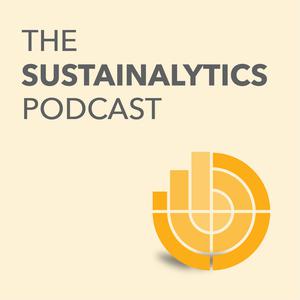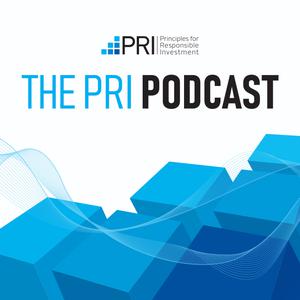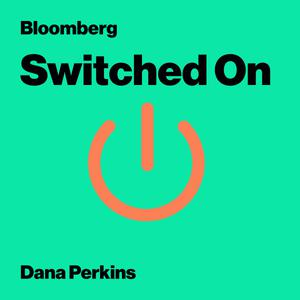
The Sustainalytics Podcast
Sustainalytics Podcast
- 22 minutes 53 secondsESG in Conversation: A Look Back at 2024Episode Summary Host:
Melissa Chase, Senior Content Marketing Manager, Morningstar Sustainalytics
Guest:- Thomas Kuh, Head of ESG Strategy, Morningstar Indexes
- Arthur Carabia, ESG Research Policy Director at Morningstar
- Kilian Theil, Associate Director, Intelligent Process Automation, Morningstar Sustainalytics
- Andrei Hera, former Senior Manager Data Science, Morningstar Sustainalytics
- Aymen Karoui, Director of Methodology and Product Architecture, Morningstar Sustainalytics
This year, ESG in Conversation examined the sustainability and climate issues that were top of mind for asset owners, asset managers, companies and financial market participants globally. Featuring insights from Morningstar Sustainalytics, listeners heard from subject matter experts on ESG, climate and regulatory issues affecting the market. In this episode, we share some key insights from this past season. Check out the full episodes via the links below and subscribe to the show on your favorite podcast app to hear what’s on the horizon in the year to come.
Share Your FeedbackPlease take a moment to share your thoughts on ESG in Conversation. You can email us at [email protected].
Key Moments00:00:00
Introduction
00:00:30
Asset owners share their voice
00:02:48
The AI revolution comes to ESG
00:07:00
Climate disclosure rules come to the US
00:10:10
Harmonizing sustainability regulations remains a challenge
00:16:36
Insights on leveraging ESG ratings in portfolio construction
00:19:50
Closing remarks
00:20:49
The last word
Links to Select Resources:- Featured episodes:
- 2024 Voice of the Asset Owner Survey – Quantitative Analysis
20 November 2024, 8:41 pm - 25 minutes 28 secondsESG in Conversation: Using ESG Data in Portfolio ConstructionEpisode Summary Host:
- Melissa Chase, Senior Content Marketing Manager, Morningstar Sustainalytics
- Aymen Karoui, Director of Methodology and Product Architecture, Morningstar Sustainalytics
How can ESG ratings help investors identify risk when constructing and maintaining their portfolios? In this episode, we explore the practical answers to this question and more. We also feature research leveraging Sustainalytics’ Low Carbon Transition Ratings and Physical Climate Risk Metrics assessing companies' misalignment with the transition to net zero.
We also discussed COP 16, which is focused on biodiversity and the key role of the private sector in addressing biodiversity loss. A recent article using data from our Biodiversity and Natural Capital Stewardship program found that many companies are at the beginning of their journeys.
Share Your FeedbackPlease take a moment to share your thoughts on ESG in Conversation. You can email us at [email protected].
Key Moments00:00:00
Introduction
00:01:07
Interview with Aymen Karoui about Morningstar Sustainalytics report series in collaboration with Natixis exploring the ESG Risk Ratings and portfolio risk
00:19:51
Overview of the “Navigating Material Climate Risks in the Global Equities Market” report
00:20:57
Overview of “Mobilizing the Private Sector for COP16: A Critical Juncture for Biodiversity Action”
00:22:29
Highlights of upcoming Morningstar Sustainalytics events
Links to Select Resources25 September 2024, 6:42 pm - 30 minutes 28 secondsESG in Conversation: When It Comes to Sustainable Investing, It's A Material WorldEpisode Summary Host:
- Melissa Chase, Senior Content Marketing Manager, Morningstar Sustainalytics
- Arthur Carabia, ESG Research Policy Director at Morningstar
On the heels of the EU parliamentary elections and ahead of pivotal contests in the U.S., the U.K. and elsewhere, ESG in Conversation met with Director of ESG Policy Research, Arthur Carabia to discuss what a change in political agendas and shifting priorities could mean for ESG and sustainability-focused regulations globally.
We also explore the topic of ESG materiality and what it means to asset owners globally, and we discuss its foundational role in the enhancements to Morningstar Sustainalytics' ESG Risks Ratings and corporate governance assessment framework.
Share Your FeedbackPlease take a moment to share your thoughts on ESG in Conversation. You can email us at [email protected].
Key Moments00:00:00
Introduction
00:01:34
Interview with Arthur Carabia about EU election outcomes and the state of ESG regulatory landscape
00:25:14
Overview of the Voice of the Asset Owner Survey 2024
00:26:34
Updates on Sustainalytics’ corporate governance assessment framework
00:28:14
Introduction to “Fundamentals of ESG Materiality: An Overview for Investors”
Links to Select Resources- Voice of the Asset Owner Survey 2024: Qualitative Insights
- On the Materiality of Corporate Governance: Themes, Applications and Best Practices
- Fundamentals of ESG Materiality: An Overview for Investors
- Webinar | Single, Double or Dynamic? An Exploration of Materiality in ESG Approaches to Investment
21 June 2024, 5:12 pm - 18 minutes 27 secondsESG in Conversation: The SEC's New Rule on ClimateEpisode Summary Host:
- Melissa Chase, Senior Content Marketing Manager, Morningstar Sustainalytics
- Arthur Carabia, ESG Research Policy Director at Morningstar
In late March, the U.S. Securities and Exchange Commission introduced a climate disclosure rule that applies to its 10,000 registrant companies. In this episode of ESG in Conversation, we welcome back Arthur Carabia to shed light on what this new rule means for companies and their investors. He also shares his take on how the rule compares to other sustainability and climate disclosure regulations globally.
Sticking to the regulatory theme, you’ll learn about the EU’s regulations on deforestation-free products and why the issue of environmental regulation is so significant across industries according to our ESG Risk Ratings.
Share Your Feedback
Finally, we share insight on the troublingly persistent issue of child labor in the cocoa supply chain.Please take a moment to share your thoughts on ESG in Conversation. You can email us at [email protected] or take this short survey.
Key Moments 00:00:00 Introduction 00:01:38 Interview with Arthur Carabia about the SEC’s new climate disclosure rule 00:12:53 Overview of the EU Regulation on Deforestation-Free Products 00:14:09 Insights from Morningstar Sustainalytics annual Industry Reports 00:15:13 Details on child labor in global cocoa supply chains
Links to Select Resources- The SEC’s Climate Disclosure Rule: A Step in the Right Direction
- EUDR: Navigating the EU Regulation on Deforestation-Free Products
- The State of ESG Risk Across Industries: Three Key Takeaways From Our Annual Industry Reports
- Child Labor in Cocoa Supply Chains: Unveiling the Layers of Human Rights Challenges
3 May 2024, 5:08 pm - 23 minutes 14 secondsESG in Conversation: The AI Revolution Comes to ESGEpisode Summary Host:
- Melissa Chase, Senior Content Marketing Manager, Morningstar Sustainalytics
- Kilian Theil, Associate Director, Intelligent Process Automation, Morningstar Sustainalytics
- Andrei Hera, Senior Manager Data Science, Morningstar Sustainalytics
In recent years the marvels of artificial intelligence have been touted across various sectors. As applications of AI technology proliferate, in this episode of ESG in Conversation we chat about how it’s being used in the ESG research space. Members of Morningstar Sustainalytics data research and development teams discuss how the company has been leveraging AI technologies for the past decade and what’s on the horizon in terms of gathering and analyzing corporate ESG risk data.
You’ll also learn more about ESG risks in global supply chains as we share insights from our recently published ESG Spotlight series. The reports explore the impact of supply chain incidents, with a focus on human rights and biodiversity loss. They also offer investors frameworks for assessing supply chain-related risks among portfolio companies and potential strategies to improve portfolio performance and mitigate losses.
Share Your Thoughts About the ShowPlease take a moment to share your thoughts on ESG in Conversation. You can email us at [email protected] or take this short survey.
Key Moments00:00:00
Introduction
00:01:17
Interview with Kilian Theil and Andrei Hera on how AI is changing the world of ESG research and assessments
00:20:52
Overview of the ESG Spotlight series on ESG risks in supply chains
Links to Select Resources18 March 2024, 5:02 pm - 16 minutes 9 secondsESG in Conversation: Asset Owners Share Their Views on the Changing Investment LandscapeEpisode Summary Host:
- Melissa Chase, Senior Content Marketing Manager, Morningstar Sustainalytics
- Thomas Kuh, Head of ESG Strategy, Morningstar Indexes
In this episode of ESG in Conversation, Thomas Kuh, Head of ESG Strategy at Morningstar Indexes shares the results from Morningstar Indexes and Morningstar Sustainalytics’ Voice of the Asset Owner Survey. Not surprisingly, asset owners are concerned about the influence of global events on the market. They are confused about ever-changing regulations and are seeking improvements and reliability from ESG service providers. Despite these challenges, asset owners also say they remain committed to sustainability and are putting more resources towards their ESG strategies.
You’ll also learn more about the low-carbon transition risks facing some of the world’s biggest food companies and the steps they can take to get their emissions reductions back on track. Finally, the start of 2024 brings new sustainability-focused regulations. The Corporate Sustainability Reporting Directive (CSRD) came into effect in the European Union on Jan. 1 and will apply to nearly 60,000 companies globally. The directive could be a watershed moment for corporate reporting as well as investors seeking more sustainability data from issuers.
Tell Us What You ThinkPlease take a moment to share your thoughts on ESG in Conversation. You can email us at [email protected] or take this short survey.
Key Moments00:00:00
Introduction
00:01:30
Interview with Thomas Kuh discussing asset owners’ views on ESG investing
00:10:52
Insights on the low-carbon transition risks of major food companies and how they can reduce emissions
00:12.33
Details on the Corporate Sustainability Reporting Directive
Links to Select Resources- Voice of the Asset Owner 2023: Quantitative Analysis
- Big Food’s Broken Promises: The Data Behind the Food Industry’s Rising Emissions
- CSRD Reporting: Preparing for Mandatory ESG Disclosure Deadlines
31 January 2024, 11:02 pm - 27 minutes 34 secondsESG in Conversation: Combatting Greenwashing in Financial MarketsEpisode Summary Host:
Melissa Chase, Senior Content Marketing Manager, Sustainalytics
Guest:Ruthann Bartello, Commercialization Director, Stewardship Services
Investors’ Greenwashing Concerns and How to Address ThemGreenwashing is a growing concern among financial market participants. Whether it’s measuring the sustainability performance of companies in a portfolio or ensuring that their own firms and offerings are not making exaggerated claims about their sustainability impacts, asset managers are on the lookout for potential greenwashing risks. Adding to the confusion is a lack of clarity around what defines a sustainable investment, as well as the growing list of regulations and reporting frameworks asset managers need to comply with.
In this episode, we discuss the European Sustainability Reporting Standards, the cornerstone of the Corporate Sustainability Reporting Directive, which should pave the way for more accessible and standardized corporate sustainability information. You also hear from Morningstar Sustainalytics’ Ruthann Bartello about the key strategies investors can use to mitigate greenwashing risks in their investment products and across their portfolios.
Share Your Feedback With the TeamPlease take a moment to share your thoughts on ESG in Conversation. You can email us at [email protected].
Key Moments00:00:00
Introduction
00:01:50
Morningstar Sustainalytics new ebook “Seeing Through the Green: As Guide to Greenwashing Risks for Asset Managers”
00:03:00
The final Corporate Sustainability Reporting Directive and its standards are published
00:4:09
Investor stewardship as a tool to combat greenwashing.
00:5:30
Interview with Ruthann Bartello on key strategies institutional investors can use to address greenwashing
00:06:07
Greenwashing explained
00:08:15
Investor concerns around greenwashing
00:09:58
What’s behind investors’ concerns
00:11:35
Consequences of greenwashing for investors
00:15:05
Key regulations related to greenwashing
00:19:31
Strategies for asset managers to mitigate against greenwashing risks
00:20:23
Tips for asset managers to build a robust investment strategy
00:24:49
Final thoughts
Links to Select Resources
5 December 2023, 8:22 pm - 13 minutes 53 secondsESG in Conversation | ISSB Sets New Standards for Sustainability ReportingEpisode Summary Host:
- Melissa Chase, Senior Content Marketing Manager, Sustainalytics
- Arthur Carabia, Director, ESG Policy Research, Morningstar
We are excited to share with you the revamped ESG in Conversation! In this new format, we’re expanding the focus beyond sustainable finance to share the latest environmental, social and corporate governance insights. In addition to highlighting recent research from our global team of ESG experts, we will continue to bring you deep dives into the ESG, climate, impact, sustainable finance and regulatory insights you need to know about.
In this episode you’ll learn about the upcoming greenhouse gas reporting requirements for companies in North America, the implications of Europe’s policy response to the climate crisis, the Fit for 55 package, and what it means for companies that supply goods and services in the EU.
Also, Morningstar’s Arthur Carabia discusses what the recently published International Sustainability Standards Boards reporting standards mean for companies and investors.
Tell Us What You ThinkPlease take a moment to share your thoughts on ESG in Conversation. You can email us at [email protected].
Key Moments00:00:00
Introduction
00:01:45
Greenhouse gas emissions requirements for North American companies
00:03:50
Interview with Arthur Carabia about the launch of the ISSB standards
00:10:40
Highlights of the EU’s Fit for 55 legislation
Links to Select Resources- Mandatory Scope 3 Emissions Reporting in the U.S. and Canada: Most Companies Are Unprepared
- Policy Responses to Climate Change: The EU’s Fit for 55 Package and Its Implications for Companies and Investors
- What the New ISSB Climate Standard Means for Investors
24 November 2023, 2:05 pm - 17 minutes 46 secondsESG in Conversation | What Does It Take To Be a Sustainability Leader in 2023 and Beyond?
In this episode of ESG in Conversation, we’re exploring the question: what does it take to be a sustainability leader in 2023 and beyond? You’ll hear from Joseph Hill, London Techstars alumn and CEO of Zephframe, about the sustainability challenges facing start-ups. You’ll also hear from Eileen Buckley, VP of Corporate Responsibility at Stryker, about the importance of integrating sustainability across an organization. Gabriel Presler, Global Head for Enterprise Sustainability at Morningstar, also joins in to discuss the role investors play in sustainability leadership.
6 September 2023, 8:36 pm - 19 minutes 33 secondsESG In Conversation | How Do Businesses, Governments and Investors Fit Into the Circular Economy?Host:
- Curtis File, Editorial Manager, ESG and Sustainable Finance
- Juliette Goulet, Project Manager, Ellen MacArthur Foundation
- Wayne Hubbard, CEO, ReLondon
- Joris Laseur, Associate Director, Stewardship, Morningstar Sustainalytics
- Jonathan Kellar, Manager, Stewardship, Morningstar Sustainalytics
As global leaders gain a more nuanced understanding of climate change, they are looking at the circular economy as a potential solution to mitigate their impact. In a circular economy, organizations aim to prevent waste throughout the value chain instead of relying solely on recycling. This approach involves sharing, leasing, reusing, repairing, and recycling materials and products for as long as possible. Proponents say the approach comes with huge potential upside. The Ellen MacArthur Foundation, for example, projects that a circular economy could reduce greenhouse gas emissions by 25%, create 700,000 jobs, and save $200 billion per year by 2040. But the path to achieving those goals is far from clear, and it will require an all-hands-on-deck effort.
In this episode of ESG in Conversation, we’re exploring the question: how do businesses, governments and investors fit into the circular economy? You’ll hear from Juliette Goulet, a seasoned sustainability practitioner from the Ellen MacArthur Foundation, about the challenges of implementing a circular economy. You’ll also hear from Wayne Hubbard, CEO of ReLondon, about putting the circular economy into practice in London, England. Joris Laseur and Jonathan Kellar from Morningstar Sustainaltyics’ stewardship team also join to discuss the role investors play in helping businesses reduce their waste and implement circular business practices.
29 June 2023, 7:43 pm - 26 minutes 14 secondsWhat’s Happening in Sustainable Finance: Green Bond Standards on the Horizon and Much MoreEpisode Summary Hosts
- Nicholas Gandolfo, Vice President, Corporate Solutions
- Aditi Bhatia, Senior Regional Manager, Corporate Solutions
With the European Union’s Green Bond Standard set to come into effect sometime next year, we look at what it could mean for the global sustainable finance market more broadly. Although the highly anticipated framework is expected to be the gold standard for what we see in the market going forward, there are ongoing concerns about its usability. Some market participants are worried about the potential difficulty in meeting all the requirements of the Green Bond Standard and whether the standard is too prescriptive in its requirements to set up a framework.
Sustainable Finance Meets AIThe sustainable debt market continues to see innovations in the types of projects being funded. One example is the use of green bonds to raise money for artificial intelligence (AI) projects related to green or social initiatives. The green bond issuance highlighted in this episode will finance AI projects related to improving the environmental performance of buildings through data analytics and energy management software. Using AI to support corporate sustainability improvements is not new, but funding such projects using sustainable debt instruments could be the next wave.
Changes Coming to the Podcast!Our sustainable finance insights show will be taking a break for the summer. We’ll be back this fall with some exciting changes to bring you more ESG, sustainable finance and responsible investing insights. In the meantime, please subscribe to ESG in Conversation on your favorite podcast platform and enjoy new episodes each month!
Key Moments 0:00:49 Market overview 0:01:36 CBI Q1 highlights report 0:03:04 LMA sustainability linked loan drafting model 0:03:28 Sustainable bond market risks 0:04:44 Gender-focused social bonds 0:05:37 Transition plan guidelines 0:05:58 Debt for nature swaps 0:06:23 IRENA report on the cost of energy transition 0:07:00 New CBI reports 0:07:42 SLB and SLL overview 0:11:35 Audience questions 0:16:08 Green bonds and loans overview 0:19:25 Labeled products, transition bonds and regulatory updates
Links to Select Resources- Climate Bonds Initiative – Sustainable Debt Market Summary Q1 2023
- Environmental Finance – LMA Publishes ‘Vital’ Sustainability-Linked Loan Drafting Model
- Morningstar Sustainalytics – Anticipating the Inevitable: What to Expect from the European Green Bonds Regulation
- Responsible Investor – Details Emerge on EU Green Bond Standard as Concerns About Uptake Remain
- Environmental Finance – Sustainable Bond Market Risks Fragmentation Amid ‘Regulatory Overload’
- BusinessWorld – No Plans for Follow-Up Offer of Catastrophe Bonds – De Leon
- WION – Bhutan Takes Steps to Set Up Green Cryptocurrency Mining Operation: Report
- Environmental Finance – ‘Huge Opportunities’ for Gender-Focused Corporate Sustainable Bond Growth
- Environmental Finance – GSAM: 36% of European Investors Ready to Invest in Social Bonds
- Forbes – Companies Going Green Should Add Finance To Sustainability Strategies
- Eco-Business – The Next Wave of Greenwashing: Offsets, Competitor Claims and ‘Transition-Washing’
- Environmental Finance – Banks Call on EU to Provide Transition Plan Guidelines
- Environmental Finance – Credit Suisse Arranges $1.6bn Debt-for-Nature Conversion With Ecuador
- IRENA – Low-Cost Finance for the Energy Transition
- Climate Bonds Initiative Reports
- Sustainalytics Second-Party Opinions
22 June 2023, 4:56 pm - More Episodes? Get the App
Your feedback is valuable to us. Should you encounter any bugs, glitches, lack of functionality or other problems, please email us on [email protected] or join Moon.FM Telegram Group where you can talk directly to the dev team who are happy to answer any queries.
 The Principles for Responsible Investment podcast
The Principles for Responsible Investment podcast
 Columbia Energy Exchange
Columbia Energy Exchange
 ESG now
ESG now
 FT News Briefing
FT News Briefing
 Switched On
Switched On
 ESG Insider: A podcast from S&P Global
ESG Insider: A podcast from S&P Global